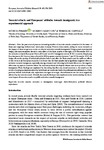Terrorist attacks and European Attitudes towards Immigrants: an experimental approach

Use este enlace para citar
http://hdl.handle.net/2183/40289
A non ser que se indique outra cousa, a licenza do ítem descríbese como Atribución-NoComercial-SinDerivadas 3.0 España
Coleccións
- Investigación (FSOC) [405]
Metadatos
Mostrar o rexistro completo do ítemTítulo
Terrorist attacks and European Attitudes towards Immigrants: an experimental approachData
2020Cita bibliográfica
Ferrín, M., Mancosu, M., Cappiali, T. (2020). Terrorist attacks and European Attitudes towards Immigrants: an experimental approach. European Journal of Political Research (59) 3, p. 491-516. https://doi.org/10.1111/1475-6765.12362
Resumo
[Abstract] Over the past several years an increasing number of terrorist attacks committed in the name of Islam and targeting civilians have taken place in many Western democracies, calling for more research on the impact of these exogenous events on citizens’ attitudes towards immigrants. Using a quasi-experimental design, this study examines the short-term effect of the Paris attacks of the night of 13 November 2015 on the attitudes towards European Union (EU) and non-EU immigrants across 28 EU countries. Employing
Eurobarometer 84.3 survey data collected in 28 European countries between 7 and 17 November 2015, the design allows the testing of individual attitudes before and after the Paris attacks and the spillover effects of this event in all European countries. It is found that the Paris attacks had a significant negative effect on attitudes towards immigrants, especially among educated and left-wing individuals. Moreover, the negative effect was stronger in countries where the national political-ideological climate was more positive towards
immigrants. These findings are explained by theorising that first emotional reactions to the attack are the results of coping mechanisms whereby individuals are confronted with disconfirmation/confirmation of their previous beliefs: individuals who experience stronger stereotype disconfirmation are the most negatively affected by the terrorist attack. Overall, the study holds important implications for understanding the shortterm impact of terrorist attacks on public attitudes towards immigrants.
Palabras chave
Terrorist attacks
Attitudes to immigrants
Stereotype dis/confirmation
Political climate
Experiment
Attitudes to immigrants
Stereotype dis/confirmation
Political climate
Experiment
Versión do editor
Dereitos
Atribución-NoComercial-SinDerivadas 3.0 España
ISSN
2047-8852






